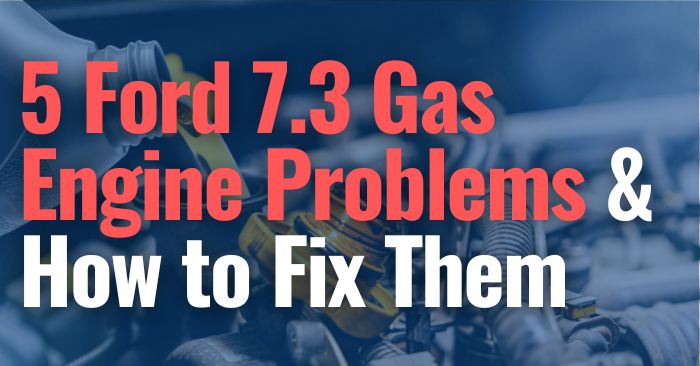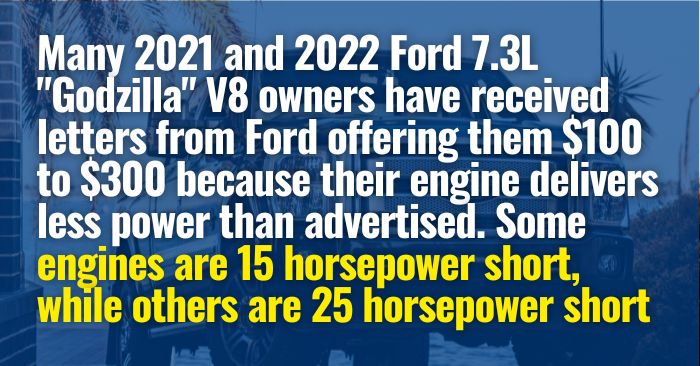
Written By: Jessica Anvar Stotz
Legally Reviewed By: Jessica Anvar Stotz

Short answer: If you own a Ford 7.3 gas engine, also known as the “Godzilla” engine, you may encounter several common issues.
Ford drivers regularly report wiring harness failures, transmission problems, cylinder scoring, difficulty starting, and poor fuel efficiency.
These problems appear to stem from design and manufacturing challenges that have surfaced since the engine’s introduction. Below are 5 of the most common issues Ford drivers encounter.
Problem #1: Wiring Harness Failures
The wiring harness in the Ford 7.3 gas engine is essential for managing electrical systems and maintaining engine performance.
When the wiring harness fails, it can cause a range of electrical malfunctions and impact overall engine function.
- What it is: The wiring harness connects various electrical and electronic systems within the engine, ensuring that signals and power are distributed effectively to all engine parts.
- Potential causes: Over time, the wiring harness can deteriorate due to heat, vibration, and environmental exposure. Manufacturing defects, such as poor-quality materials or assembly errors, can also lead to premature failure.
- Symptoms: A failing wiring harness can manifest as engine misfires, causing irregular performance or stalling. You may also experience electrical issues with components like lights, sensors, or the dashboard. The check engine light might turn on due to disrupted signals.
- Potential fix: To address wiring harness issues, thoroughly inspect the harness for signs of damage or wear. If any problems are found, replace the faulty wiring harness to restore proper electrical connections and ensure smooth engine operation.
Problem #2: Transmission Issues
The 7.3 gas engine is paired with a 10-speed heavy-duty TorqShift transmission, which can experience rough shifting and occasional failure to shift. These issues are often attributed to the complexity of the transmission design.
- What it is: The 10-speed heavy-duty TorqShift transmission is designed to provide smooth and efficient power delivery across a range of driving conditions. This sophisticated system requires precise calibration and ongoing maintenance to function correctly.
- Potential causes: The design of the 10-speed transmission can lead to calibration and synchronization challenges. Software glitches might disrupt smooth shifting, and normal wear and tear over time can cause internal components to degrade, affecting performance.
- Symptoms: Transmission issues may present as noticeable jerks or delays during gear changes, difficulty shifting or being stuck in a particular gear, and the illumination of transmission-related warning lights on the dashboard.
- Potential fix: Address transmission problems by adhering to a regular maintenance schedule, including checking and replacing transmission fluid as necessary. Ensure the transmission control module software is up to date to resolve known issues. For more severe problems, it may be necessary to repair or replace the transmission to restore proper function.
Problem #3: Cylinder Scoring
Cylinder scoring occurs when the inner walls of the engine’s cylinders are damaged, leading to diminished engine performance and increased oil consumption. This issue can arise from poor lubrication, manufacturing defects, or contaminants in the engine oil.
- What it is: Cylinder scoring refers to the wear or damage on the inner surfaces of the engine’s cylinders. This damage often manifests as grooves or scratches, which can significantly reduce the engine’s efficiency and overall performance.
- Potential causes: Inadequate lubrication, resulting from insufficient or degraded engine oil, can lead to metal-to-metal contact and cylinder scoring. Manufacturing defects can introduce weaknesses or inconsistencies in the cylinder walls, making them more susceptible to damage. Contaminants such as dirt or debris in the engine oil can also cause abrasive wear on the cylinder walls.
- Symptoms: Signs of cylinder scoring include reduced engine performance, a noticeable increase in oil consumption requiring frequent top-ups, excessive blue or gray smoke from the exhaust indicating burning oil, and unusual knocking or tapping noises from the engine.
- Potential fix: To address cylinder scoring, begin by thoroughly inspecting the cylinders for damage. Depending on the extent of the scoring, repairs may involve honing the cylinder walls to smooth out minor damage or replacing the affected components entirely. Keep the engine oil clean by using high-quality filters and removing any debris to prevent future issues.
Problem #4: Starting Issues
The Ford 7.3 gas engine can experience starting issues, which can be attributed to problems within the fuel system, ignition system, or related components.
- What it is: Starting issues involve difficulties in getting the engine to start or having it run smoothly once started.
- Potential causes: Fuel system issues can arise from problems with the fuel pump, fuel injectors, or fuel filter. If these components fail to supply the correct amount of fuel, the engine may struggle to start or perform poorly. Ignition problems, such as faulty spark plugs, malfunctioning ignition coils, or issues with the ignition control module, can lead to poor ignition performance and starting difficulties. Battery issues, including a weak or dead battery, can also prevent the engine from starting.
- Symptoms: Common symptoms of starting issues include the engine taking longer than usual to start or requiring multiple attempts. You may notice rough idling where the engine runs unevenly or stalls shortly after starting. In some cases, the engine may fail to start entirely despite turning the key. Warning lights such as the check engine light may also illuminate, indicating underlying issues.
- Potential fix: To address starting issues, begin with fuel system maintenance. Check and replace the fuel filter, inspect the fuel pump, and clean or replace the fuel injectors if necessary. Examine the ignition system, replacing faulty spark plugs, ignition coils, and the ignition control module as needed. Ensure the battery is fully charged and replace it if it is weak or old. Lastly, test the starter motor and replace it if it is not functioning properly.
Problem #5: Poor Gas Mileage
The Ford 7.3 gas engine can struggle with fuel efficiency, often due to its design prioritizing power over economy.
- What it is: Poor gas mileage occurs when the engine consumes more fuel than expected for the distance traveled. This issue can lead to increased fuel expenses and more frequent refueling.
- Potential causes: The 7.3 gas engine is built to deliver high power and torque, which can inherently reduce fuel efficiency compared to engines designed with fuel economy in mind. Driving habits such as rapid acceleration, high-speed driving, and aggressive driving can exacerbate this issue, further lowering fuel economy. Maintenance problems, including dirty air filters, worn spark plugs, and low tire pressure, can also negatively affect fuel efficiency. Carrying heavy loads or towing can also significantly increase fuel consumption, as the engine works harder to handle the added weight.
- Symptoms: Symptoms of poor gas mileage include needing to refuel more often than usual, higher fuel costs, and lower miles per gallon (MPG) readings either displayed on the vehicle’s dashboard or calculated manually.
- Potential fix: To enhance fuel efficiency, start by adopting fuel-efficient driving practices, such as smooth acceleration, maintaining a consistent speed, and avoiding excessive idling. Regular maintenance is crucial; this includes changing the air filter, replacing old spark plugs, and ensuring that tires are properly inflated. Reducing unnecessary weight and avoiding heavy towing can also help. Using high-quality fuel and considering fuel additives designed to improve engine performance can contribute to better fuel efficiency.

Is There a Ford 7.3 Engine Recall?
Yes, there have been recalls and reported issues related to the Ford 7.3-liter engine, though they haven’t resulted in widespread recalls specific to the engine itself.
One notable recall affected 2021 Ford E-Series vehicles, which involved a mispositioned insulation on the underside of the engine cover:
1. 2021 Ford E-Series Vehicles (NHTSA Campaign Number: 20V788)
This recall was issued due to mispositioned insulation on the underside of the engine cover. If the insulation is not properly placed, it can disrupt thermal management, leading to potential engine overheating.
Overheating increases the risk of fire, posing a significant safety hazard. Ford advised owners of affected vehicles to visit their dealers for an inspection and correction of the insulation placement to ensure proper thermal management and vehicle safety.
2. 2016-2017 Ford Flex, Lincoln MKT, and 2017 Ford Explorer (NHTSA Campaign Number: 16V925000):
This recall addressed improperly brazed turbocharger oil supply tubes in certain vehicles, including the 2016-2017 Ford Flex, Lincoln MKT, and 2017 Ford Explorer.
The defect could cause oil to leak onto engine components, creating a fire hazard if the oil contacts hot surfaces.
The solution involved replacing the faulty oil supply tubes with properly brazed ones to prevent leaks and enhance vehicle safety.
3. 2022 Ford F-150 (NHTSA Campaign Number: 22V484)
The 2022 Ford F-150 faced a recall due to potential issues with the engine and cooling system.
Certain components were found to be at risk of failure, potentially leading to engine overheating or other performance issues.
This recall was critical in preventing engine problems and reducing the risk of fire. Ford dealers were instructed to inspect and repair the affected components to maintain vehicle reliability and safety.
If you own a vehicle equipped with a 7.3-liter engine and are experiencing issues, you should contact your local Ford dealer for more information.
They can check if your vehicle is affected by any recalls and provide guidance on necessary repairs or inspections.
Who Pays for the Issues I’m Experiencing?
The responsibility for paying for engine repairs in your Ford vehicle can vary based on several factors, including the cause of the problem, the vehicle’s age, and its warranty status. Consider the following points:
- Warranty Coverage: If your vehicle is still under the manufacturer’s warranty, Ford typically covers the repair costs for engine issues. This includes both the standard warranty and any extended warranties you may have purchased.
- Recalls: If the engine problem is related to a recall, Ford will cover the repair costs.
- Out-of-Warranty Repairs: If your vehicle is out of warranty and the problem isn’t related to a recall, you might be responsible for the repair costs. We always advise discussing the issue with your Ford dealer, as they might offer some assistance or a reduced rate.
If you’re dealing with engine issues, visit your local Ford dealer for an evaluation. They can provide specific information on whether your issue is covered under warranty, part of a recall, or if any financial assistance might be available.
How Hiring an Attorney Can Help
If you’re experiencing problems with your Ford 7.3-liter engine, consulting with an experienced lemon law attorney can be extremely helpful.
An attorney specialized in lemon law or consumer rights can offer expert advice and help you assess whether you have a valid claim.
They can guide you through the necessary steps to address the issue, which might include repairs, a vehicle replacement, or financial compensation.
Lemon law attorneys are skilled negotiators who can handle discussions with Ford or the dealership on your behalf. If litigation becomes necessary, your lawyer will represent you in court, file a lawsuit, and advocate for your interests throughout the legal process.
In many cases, these attorneys work on a contingency basis, meaning that your legal fees are covered by the vehicle manufacturer if you win your case.
Managing legal matters can be overwhelming- but, having an attorney take charge allows you to focus on other priorities. When dealing with major automakers like Ford, you will need the most effective legal representation possible.
The Lemon Law Experts specialize in providing top-tier legal assistance for individuals with defective Ford vehicles, including those with 7.3-liter engines. Since 2009, our attorneys have secured millions in refunds and cash compensation for numerous claims against major auto manufacturers.
The Lemon Law Experts are here to answer any questions you have about your Ford 7.3-liter engine or other vehicle concerns.
Our lemon law specialists are dedicated to ensuring you receive fair compensation and justice. We offer a free, no-obligation consultation to evaluate your case and provide the support you need- visit our website to learn more.
Citations
Ford Media Center. “Ford 7.3-Liter V8 Offers Best-In-Class Gas Power And Torque For Heavy Duty Pickups.” Ford Media, 1 Aug. 2019, https://media.ford.com/content/fordmedia/fna/us/en/news/2019/08/01/ford-73-liter-V8-best-in-class-gas-power-torque-heavy-duty-pickup.html.
National Highway Traffic Safety Administration. “Part 573 Safety Recall Report 20V-788.” NHTSA, 11 Dec. 2020, https://static.nhtsa.gov/odi/rcl/2020/RCLRPT-20V788-7593.PDF.
Ford Authority. “2017 Ford Explorer Recall: NHTSA Campaign Number 16V925000.” Ford Authority, https://fordauthority.com/fmc-recalls/ford-recalls/ford-explorer-recalls/2017-ford-explorer-recalls/2017-ford-explorer-recall-nhtsa-16v925000/.
National Highway Traffic Safety Administration. “Part 573 Safety Recall Report 22V-484.” NHTSA, 14 July 2022, https://static.nhtsa.gov/odi/rcl/2022/RCLRPT-22V484-6430.PDF.




